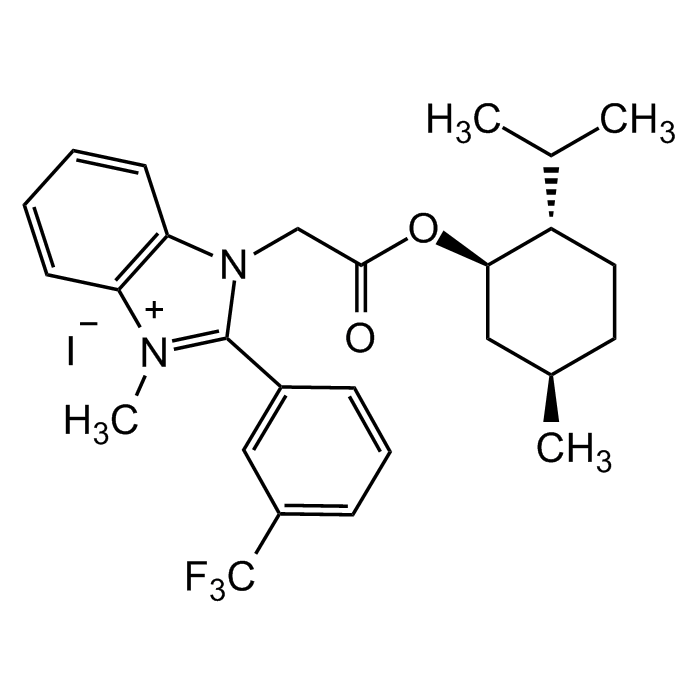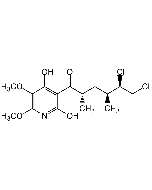Cookie Policy: This site uses cookies to improve your experience. You can find out more about our use of cookies in our Privacy Policy. By continuing to browse this site you agree to our use of cookies.
AdipoGen Life Sciences
S-Gboxin iodide
As low as
120
CHF
CHF 120.00
In stock
Only %1 left
AG-CR1-3533-M0011 mgCHF 120.00
AG-CR1-3533-M0055 mgCHF 480.00

| Product Details | |
|---|---|
| Synonyms | 1-(2-(((1R,2S,5R)-2-Isopropyl-5-methylcyclohexyl)oxy)-2-oxoethyl)-3-methyl-2-(3-(trifluoromethyl)phenyl)-1H-benzo[d]imidazol-3-ium iodide |
| Product Type | Chemical |
| Properties | |
| Formula |
C27H32F3N2O2 . I |
| MW | 473.6 . 126.9 |
| CAS | 2101317-21-7 |
| Purity Chemicals | ≥98% (1H-NMR) |
| Appearance | Solid. |
| Solubility | Soluble in DMSO (50mg/ml), ethanol (50mg/ml) or water (2mg/ml). |
| Identity | Determined by 1H-NMR. |
| InChi Key | DCAJNAWCJSUZDG-DZJKTSMVSA-M |
| Smiles | CC(C)[C@@H]1CC[C@@H](C)C[C@H]1OC(CN2C(C=CC=C3)=C3[N+](C)=C2C4=CC(C (F)(F)F)=CC=C4)=O.[I-] |
| Shipping and Handling | |
| Shipping | AMBIENT |
| Short Term Storage | +4°C |
| Long Term Storage | -20°C |
| Handling Advice | Keep cool and dry. |
| Use/Stability |
Stable for at least 2 years after receipt when stored at -20°C. Stock solutions are stable for at least 3 months when stored at -20°C. |
| Documents | |
| MSDS |
 Download PDF Download PDF |
| Product Specification Sheet | |
| Datasheet |
 Download PDF Download PDF |
Description
- Potent mitochondrial ATP synthase (ATPases (F0F1)) inhibitor, consequently leading to inhibition of oxidative phosphorylation (OXPHOS).
- Useful agent for immunometabolism research. Inhibits ATP synthase by blocking its proton channel (F0 subunit), which is necessary for oxidative phosphorylation of ADP to ATP (energy production), significantly reducing electron flow through the electron transport chain.
- Potent antitumor agent that inhibits oxidative phosphorylation and consequently growth and proliferation of mouse and human glioblastoma (GBM) with an IC50 of 470nM. Shown to rapidly and irreversibly compromise oxygen consumption in glioblastoma cells. This functional Gboxin analog has excellent metabolic stability, enhanced plasma stability and pharmacokinetic properties, and is suitable for in vivo studies.
- Gboxin-resistant cells require a functional mitochondrial permeability transition pore that regulates pH and thus impedes the accumulation of Gboxin in the mitochondrial matrix. Administration of a metabolically stable Gboxin analog inhibits glioblastoma allografts and patient-derived xenografts. Gboxin toxicity extends to established human cancer cell lines of diverse organ origin and shows that the increased proton gradient and pH in cancer cell mitochondria is a mode of action that can be targeted in the development of antitumor reagents.
Product References
- Gboxin is an oxidative phosphorylation inhibitor that targets glioblastoma: Y. Shi, et al.; Nature 567, 341 (2019)








